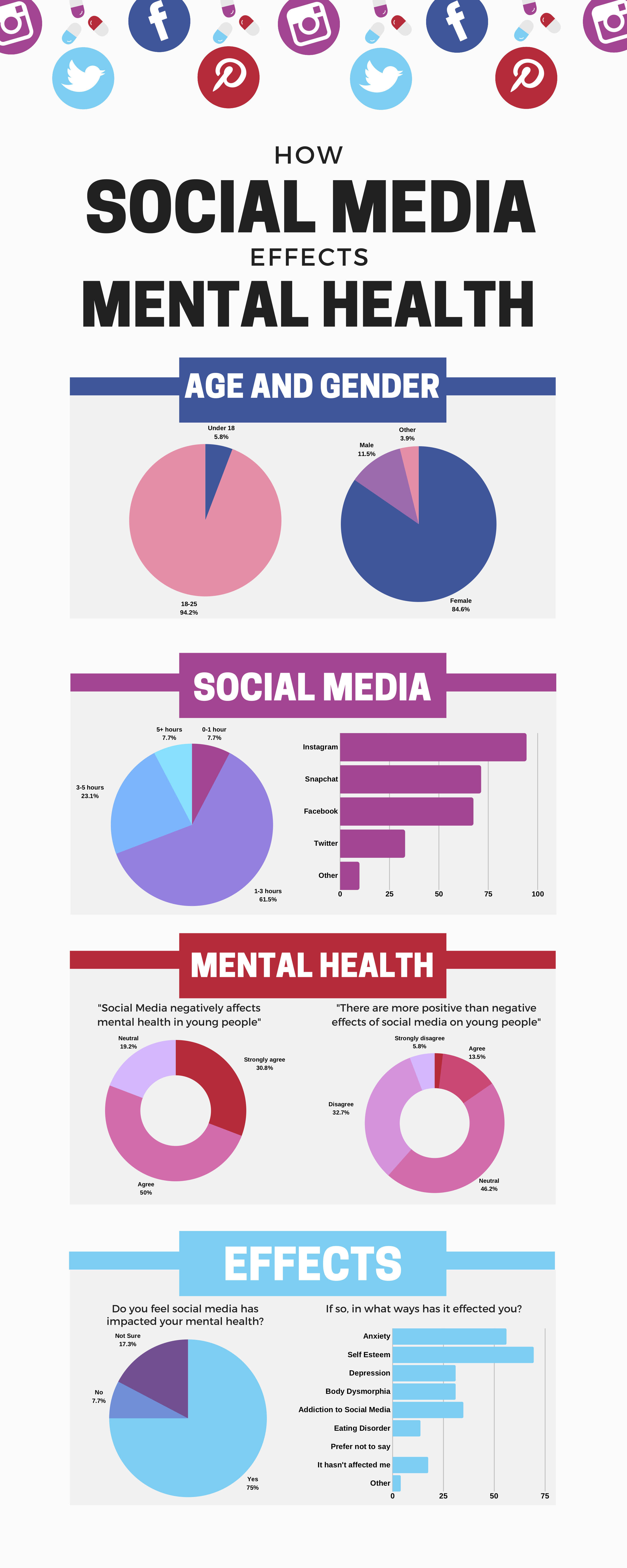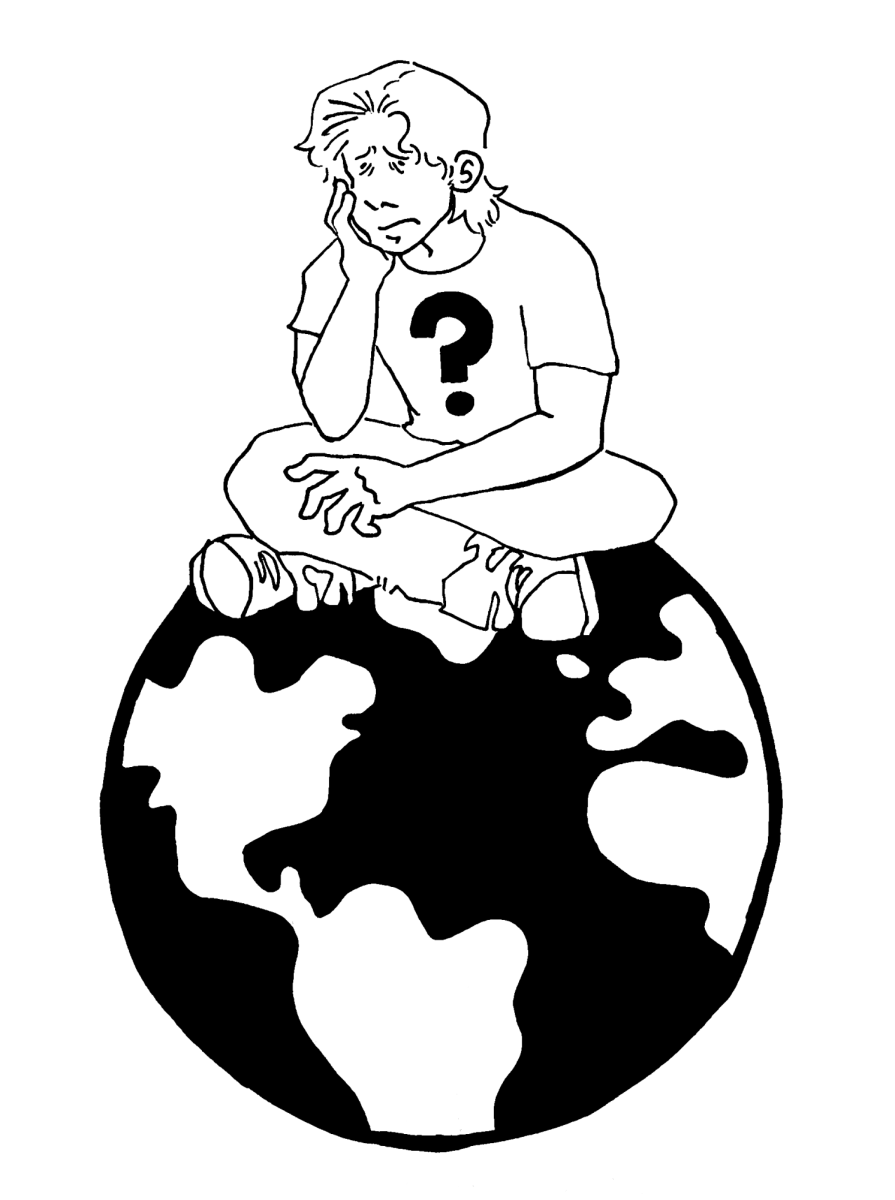The effects of the internet and speculation about what it means for the future
Josie Laur, Copy Editor
Originally published June 11, 2021
Graphic by District
TW for: body dysmorphia, self-harm, suicide mentions
People are getting hurt by the online world, both physically and mentally. “Oh,” you might say, “It’s just an app”—no, it’s not. As we see in Netflix’s “The Social Dilemma,” according to the Centers for Disease Control and Prevention, child suicide rates have increased by up to 150% in the past decade.
Now, can social media be a useful tool? Of course, and I would argue that in many cases, that was what it was intended to do (mostly because I don’t want to believe that anyone started out with the intent to harm others, especially children). Social media makes it easy to connect with new and old friends, and they can be great platforms for things like spreading awareness, sharing info, or supporting an artist you like.
At the risk of sounding like an old-timer, I really believe that one of the big issues with what social media has grown into is the anonymity that it provides. The screen adds a layer of protection and insulation that we don’t get in regular, face-to-face interactions, and that makes people bold. They can just say whatever and be whomever they want.
After all, if you say something rude in the comments of a stranger from across the world, what can they do about it? They could block you, sure, but that’s not going to stop you from moving on and leaving the same type of comments on someone else’s content.
One of the big problems with this, aside from the obvious, is that younger teenagers and kids are seeing these comments (that could range from rude to downright aggressive) and learning that it’s fine to speak to others in that way. There’s an increasing lack of being held accountable or being told that it’s not okay to treat others in this way, because “it’s just internet culture.”
If an entire generation is being taught that you can say whatever you want because “they’ll never know it’s me,” I see a t-o-x-i-c future ahead.
The point is, it’s not good. Our attention spans are shot, our self-esteems are on the floor, and the mental health-related issues are doing nothing but growing.
“Snapchat dysmorphia” is a great example—people are seeing themselves look “perfect” with the help of filters on platforms like Snapchat and Instagram, taking those filtered pictures of themselves to plastic surgeons, and asking the doctors to make them look like that. This is exacerbated by thoughtless or deliberately harmful comments of the sort mentioned above—“why do your ears look like that?” “Gross, look at all that acne—she must not take care of her skin.”
An adult can make their own choices about altering their bodies like that, but teens, tweens and even younger are using those same filters and seeing their favorite “Internet Influencers” casually extolling the virtues of plastic surgery…and then suddenly a ten year old believes that she’s not pretty or perfect or right enough, even while her face has barely begun the changes it’s going to go through in puberty.
A small disclaimer here: I am not knocking the entirety of plastic surgery. Some people need it for medical reasons, some people need it for feeling secure and confident—that’s all well and good, and very different from a 12 year old wanting to look CGI generated.
The thing is, it’s so so easy to see something on the internet and just…believe it. We see this with self-image issues, but it certainly doesn’t stop there. For instance, take the way that news and information spreads online.
Thanks to echo chambers, and the way that the algorithm calculates our feeds so that we see people and posts and opinions that we already agree with, a general agreement on what constitutes “The Truth” is becoming more and more polarized. According to “The Social Dilemma,” fake news on Twitter spreads six times faster than real news.
We can practice media literacy and our critical thinking skills as much as we want, but when our society has built itself into something that relies so heavily on social media and the internet for communication (not to mention news, facts and general education), it’s harder and harder to avoid falling into these fake-news traps. And, again, that goes double for the littles—how is an eight year old supposed to know that their favorite streamer is spreading information from a gossip site as if it were the one and only truth? They just believe that information, take it and internalize it.
That leads me to my next point. The parasocial relationship between people working on the internet (YouTubers, influencers) is really important to notice and discuss because, again, this involves young children.
A parasocial relationship is a one-sided, almost imbalanced dynamic that we often see with performers. For example, a stand-up comedian is looking out at a sea of strangers as they perform, and they will still be strangers by the end of the show, but the audience will probably feel (if the comedian is any good) like, “hey, I like that guy! It’s so cool that I now know something about him, his life and his sense of humor!”
YouTubers are a really prime example of this. If you have a favorite YouTuber, and they post weekly, maybe their weekly video becomes a regular part of your routine. “I can’t wait to go see what David is up to this week! He always knows how to make me smile. And then I’ll watch James’s channel—he always gives the best advice.” While you’re watching a person on the screen talk directly to You (“hey sisters!”) and you are part of their Group because you Love and Know them…they’re still just speaking to their camera. They don’t know you.
YouTube is really interesting because, even though it can feel like TV, it’s (usually) not. A well-loved actor is still an actor. They’re interacting with other people, they typically don’t look at the camera—you’re watching a production, a show, and you know it.
YouTubers, on the other hand, often have to rely on this parasocial dynamic for their jobs. People like and interact with them because something about the way that they appear on camera appeals to the person watching and, again, because they don’t just upload one thing (like a movie) but instead have a changing and evolving life, we begin to feel as if we know them.
Not to keep beating my poor, dead horse, but think about what this means for little kids. Not through any fault of their own, but just because they’re young and their brains are still developing, this performer on the internet becomes a Person to them. They trust and like and believe in them as if they were a friend, because that’s essentially what they become.
All of this can have really horrible consequences because, unfortunately, the internet is as available to bad people as it is to good. For example, in a YouTube video titled “Finally talking about MaximilianMus” from Twitch streamer and YouTuber Weest, he discusses his experience with a malicious internet delinquent—who is actually a fully grown adult from Europe—who essentially established an online cult of children via manipulation and abuse. Under the motto of “it’s just a joke,” MaximilianMus supporters helped him harass both the video’s creator and others.
As Weest mentions, once he and the other victims came forward and described what was going on, a lot of these children (the “attackers”) apologized. They just thought it was a fun thing to do, and an adult that they trust/ed told them it was fine, so why wouldn’t it be?
It all just makes me wonder what the future will be like for these kids. If you’re introduced to the internet as a second-nature thing from a very early age (YouTube for Kids, teachers assigning online projects, etc.) then it—and all the negative side-effects—becomes part of your developmental growth. That seems to bode ill for what you and your mental state will be like as an adult—or even a slightly older child.
I think that there’s a little bit of stigma around being careful on the internet—“those adults didn’t grow up like we did, so they’re just scared. We understand how it works”—which is why it’s important that youths speak up about the risks as well as adults. There’s a line between an age-difference disconnect about a subject and legitimate risks that can be recognized (even by those younger than 40).
It’s pretty clear that the internet and social media platforms aren’t just going to go away. There are things we can do to control some of the above—such as implement regulations (that should already exist!) around selling and collecting data—but I worry that there are other aspects that are simply out of our control.
Big social media platforms and their contained algorithms are largely run by massive computer systems that humans don’t have much say in. We designed the code, but that code is meant to learn and grow and develop and it learns new information, which means it quickly becomes something beyond what a team of people can monitor.
I want to reiterate that I’m not saying that the internet is all bad. YouTube can be a genuinely great resource. There are a ton of amazing apps out there, from ones that just show a picture to a fan (“for a genuine cooling experience”) to ones that can help teach you a new language. As I mentioned, social media can even be a good thing, for things like spreading awareness or (re)connecting with friends, or just posting a cute picture of yourself!
I just think that we need to be cautious, sooner rather than later, because it’s far better to be safe rather than sorry—not only for ourselves, but also for future generations.
Some additional information about mental health as related to the internet:
https://www.center4research.org/social-media-affects-mental-health/
https://www.mcleanhospital.org/essential/it-or-not-social-medias-affecting-your-mental-health
https://etactics.com/blog/social-media-and-mental-health-statistics
https://www.ncbi.nlm.nih.gov/pmc/articles/PMC7364393/
Resources for mental health:
Depression and Bipolar Support Alliance: 800-826-3632
Hopeline – Teen to teen peer counseling: 877-YOUTHLINE
Mental Health America: 800-969-NMHA (6642)
National Alliance on Mental Illness – Support, information, and referrals: 800-950-NAMI (6264)
National Suicide Prevention Hotline: 800-273-TALK (8255)

























